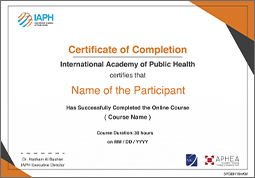Epidemiology of Environmental and Occupational Health
Description
This course is concerned with the environmental and occupational branches of epidemiology. It introduces the basic epidemiologic concepts within the framework of environmental health. Occupational epidemiology studies the effect of a variety of exposures in the workplace, such as chemical, biological or physical (e.g., noise, heat, radiation) agents on workers and evaluate adverse health outcomes in order to determine if an agent or set of agents may explain their disease.
Participants will learn to link external factors that affect the incidence, prevalence, and geographic range of health conditions. They will also illustrate how they are used to address public health problems. This course also covers a wide range of topics that are related to the application of epidemiological methods in populations of workers
Learning Outcomes
- Specify approaches for assessing, preventing and controlling environmental hazards that pose risks to human health and safety.
- Explain the general mechanisms of toxicity in eliciting a toxic response to various environmental exposures.
- Comprehend basic ethical and legal principles pertaining to the collection, maintenance, use and dissemination of epidemiologic data.
- Draw appropriate inferences from epidemiologic data.
- Evaluate the strengths and limitations of epidemiologic reports
- Bridge the connection between fundamentals of study design and principles in epidemiologic methods
- Use epidemiological techniques to conduct occupational studies that are suitable to assess risk in a workplace
- Evaluate the occupational studies methodologies, flaws and limitations.
- Environmental Epidemiology: Basic Principles and General Practice.
- Study Designs in Environmental Epidemiology.
- Assessments in Environmental Epidemiology.
- Toxic Effects of Heavy Metals.
- Environmental Disease: Mutation, Cancer, and Birth Defects - Part 1.
- Environmental Disease: Mutation, Cancer, and Birth Defects - Part 2.
- Epidemiology of Indoor Air Pollution.
- Benefits of SEA.


Certificate
